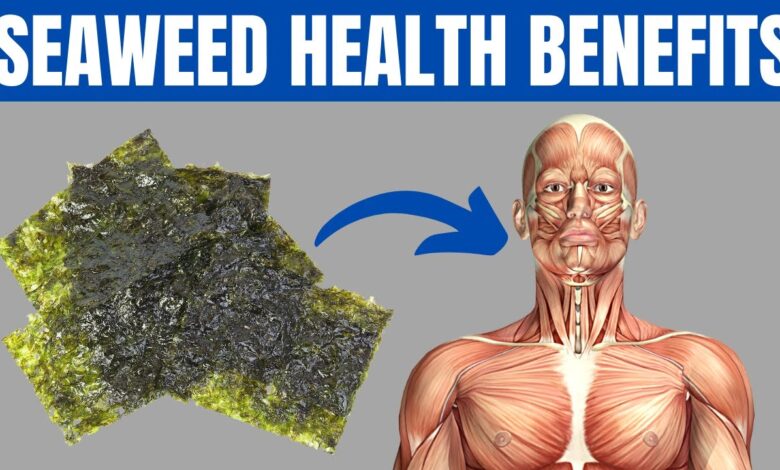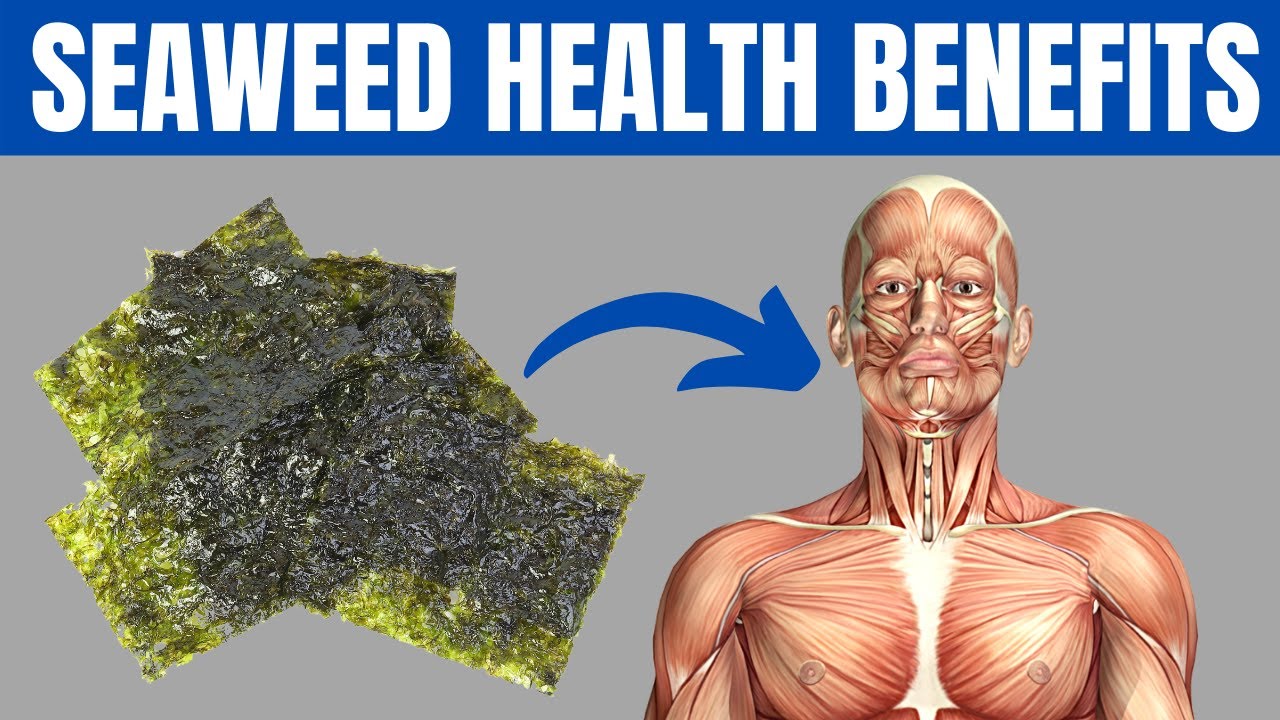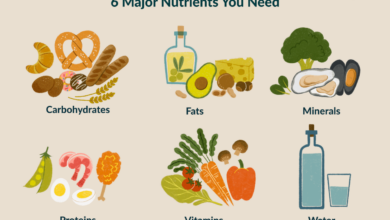
The Benefits of Adding Seaweed to Your Diet
The benefits of adding seaweed to your diet are vast and exciting, making this humble ocean plant a true culinary and nutritional powerhouse. Seaweed, with its unique texture and flavor, offers a treasure trove of vitamins, minerals, and antioxidants that can transform your health from the inside out.
From boosting digestion and immunity to promoting heart health and blood sugar regulation, seaweed’s potential health benefits are truly remarkable. This versatile ingredient can be easily incorporated into a variety of dishes, adding a burst of flavor and nutrients to your meals.
Let’s explore the incredible world of seaweed and uncover the reasons why it should be a regular part of your diet.
Nutritional Powerhouse: The Benefits Of Adding Seaweed To Your Diet
Seaweed, a humble marine plant, packs a powerful punch of nutrients. It’s a treasure trove of vitamins, minerals, and other beneficial compounds that can significantly enhance your health and well-being.
A Diverse Array of Vitamins and Minerals
Seaweed is an excellent source of various vitamins and minerals, including:
- Vitamin A:Essential for vision, skin health, and immune function.
- Vitamin B12:Crucial for nerve function, cell growth, and red blood cell production.
- Vitamin C:A potent antioxidant that supports immune function and collagen synthesis.
- Vitamin K:Vital for blood clotting and bone health.
- Iodine:Essential for thyroid hormone production, which regulates metabolism.
- Iron:Necessary for red blood cell production and oxygen transport.
- Calcium:Vital for strong bones and teeth.
- Magnesium:Supports muscle function, nerve function, and blood sugar control.
- Potassium:Important for maintaining blood pressure and fluid balance.
The Unique Benefits of Seaweed’s Essential Fatty Acids, Fiber, and Antioxidants
Seaweed offers a unique combination of essential fatty acids, fiber, and antioxidants that contribute to various health benefits:
- Essential Fatty Acids:Seaweed contains omega-3 fatty acids, particularly EPA and DHA, known for their anti-inflammatory properties and heart health benefits. These fatty acids are also crucial for brain function and cognitive health.
- Fiber:Seaweed is a good source of dietary fiber, which promotes digestive health, helps regulate blood sugar levels, and contributes to feelings of fullness.
- Antioxidants:Seaweed is rich in antioxidants, such as polyphenols and carotenoids, which help protect cells from damage caused by free radicals. This can contribute to reduced risk of chronic diseases like heart disease and cancer.
Comparing Seaweed’s Nutritional Profile to Other Common Vegetables, The benefits of adding seaweed to your diet
Seaweed often surpasses many common vegetables in terms of its nutrient density. For example, a single serving of nori seaweed can provide more calcium than a glass of milk, more iron than a cup of spinach, and more iodine than a pound of cod.
Seaweed is a nutritional powerhouse packed with vitamins, minerals, and fiber, making it a fantastic addition to any weight management plan. It’s low in calories and high in volume, helping you feel fuller for longer. And, if you’re looking for a sustainable way to reach your weight goals, check out these 4 tips to keep the weight off for good.
Seaweed also aids in digestion and can help regulate blood sugar levels, making it a valuable tool in your weight loss journey.
This makes seaweed a valuable addition to a balanced diet.
Seaweed is packed with nutrients, including iodine, which is crucial for thyroid health. While you’re boosting your intake with delicious dishes like a bacon ham egg wrap , remember that seaweed can also be incorporated into salads, soups, and even smoothies for a unique flavor and added nutritional value.
Health Benefits
Seaweed, a culinary delight and a nutritional powerhouse, offers a myriad of health benefits beyond its unique taste and texture. From supporting digestive health to bolstering immunity, seaweed’s diverse bioactive compounds work synergistically to promote overall well-being.
Digestive Health
Seaweed is rich in dietary fiber, a crucial component for maintaining a healthy digestive system. Fiber acts as a prebiotic, nourishing the beneficial bacteria in the gut, which in turn contribute to better digestion, nutrient absorption, and a robust immune system.
Seaweed is packed with nutrients, including iodine, which is essential for thyroid function and metabolism. This is particularly important for runners, as a healthy thyroid helps regulate energy levels and supports endurance. To fuel those long runs, runners need carbohydrates, which provide the energy needed to power through miles.
Learn more about why runners need carbs and how they contribute to performance. Seaweed also provides complex carbohydrates, offering a sustained energy release that can help you maintain your pace and avoid hitting a wall during your runs.
- Seaweed’s fiber content promotes regular bowel movements, preventing constipation and promoting a healthy gut microbiome.
- The soluble fiber in seaweed can help regulate blood sugar levels, preventing spikes and crashes, particularly after meals rich in carbohydrates.
- Seaweed’s fiber content can contribute to a feeling of fullness, aiding in weight management and reducing appetite.
Reducing Inflammation and Boosting Immunity
Seaweed’s anti-inflammatory properties stem from its abundance of antioxidants, such as polyphenols and flavonoids. These compounds combat oxidative stress, which is a major contributor to inflammation.
- Seaweed’s anti-inflammatory properties may help alleviate symptoms associated with inflammatory conditions, such as arthritis, inflammatory bowel disease, and asthma.
- The polysaccharides in seaweed, such as fucoidan, have been shown to stimulate immune cells, enhancing the body’s natural defense mechanisms.
- Seaweed’s immune-boosting properties may contribute to a reduced risk of infections and allergies.
Heart Health and Blood Sugar Regulation
Seaweed’s rich nutrient profile plays a significant role in promoting heart health and blood sugar regulation.
- Seaweed contains omega-3 fatty acids, which have been linked to reduced risk of heart disease. These fatty acids can help lower blood pressure, reduce triglyceride levels, and improve blood vessel function.
- Seaweed’s fiber content can help regulate blood sugar levels by slowing down the absorption of glucose from the digestive tract.
- Seaweed’s minerals, such as potassium and magnesium, play vital roles in maintaining healthy blood pressure.
Environmental Impact

Seaweed farming is a sustainable and environmentally friendly way to produce food, offering a unique and positive contribution to our planet’s health. This sustainable approach to food production is a testament to the remarkable properties of seaweed.
Sustainable Seaweed Farming
Seaweed farming is a form of aquaculture that involves cultivating seaweed in the ocean. It is considered a sustainable practice because it does not require freshwater, fertilizers, or pesticides. Seaweed is a natural filter, absorbing nutrients from the water and contributing to a healthier marine environment.
- Seaweed farming can be done in areas that are not suitable for traditional agriculture, such as shallow coastal waters.
- Seaweed farming can help to improve water quality by absorbing excess nutrients, such as nitrogen and phosphorus.
- Seaweed farming can also help to create jobs and support local economies.
Seaweed’s Role in Reducing Carbon Dioxide Emissions
Seaweed is a powerful carbon sink, absorbing carbon dioxide from the atmosphere as it grows. This makes seaweed farming a valuable tool in the fight against climate change.
- Seaweed can absorb up to 20 times more carbon dioxide per acre than land-based crops.
- Seaweed can be used to produce biofuels, which can help to reduce our reliance on fossil fuels.
- Seaweed can also be used to create bioplastics, a sustainable alternative to traditional plastics.
Seaweed’s Contribution to a Sustainable Food System
Seaweed is a highly nutritious and versatile food that can contribute to a more sustainable food system.
- Seaweed is a good source of protein, fiber, vitamins, and minerals.
- Seaweed can be used in a variety of dishes, from salads to soups to sushi.
- Seaweed is a low-calorie and low-fat food, making it a healthy choice for people of all ages.
End of Discussion

Incorporating seaweed into your diet is a simple yet powerful step towards a healthier and more sustainable lifestyle. Its diverse nutritional profile, coupled with its culinary versatility and environmental benefits, makes seaweed a true gem in the world of food.
So, whether you’re looking to enhance your health, explore new flavors, or support a more sustainable food system, consider adding seaweed to your plate today.






